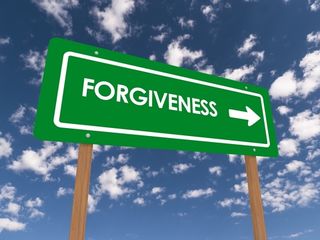Forgiveness
How the Idea of Forgiveness Can Change the World—and You
The world has neglected the idea of forgiveness at its peril. Time for a change.
Posted March 20, 2018
I come to you today with an idea. Ideas can lift up or tear down. They can be conduits for good or for great evil. Having studied the idea of forgiveness for the past 33 years, I am convinced that to date, the world has missed one of its greatest opportunities: to understand, nurture, and bring forth the idea of forgiveness within the human heart, within families, schools, workplaces, houses of worship, communities, nations, and between nations.

It is not an opportunity missed in that it now has passed us by. Instead, it is an eternal idea, one that will transcend your and my lifetime and live on long after we are gone. Yet, its time is now and this is why I come to you with this idea that can change the world.
This is not an idea based on idealism or wishful thinking. The idea has been forged over three decades of putting forgiveness to the test through randomized experimental and control group trials with: a) elderly struggling with injustices (Hebl & Enright, 1993), b) parentally-love deprived university students (Al-Mabuk, Enright & Cardis, 1995), c) incest survivors (Freedman & Enright, 1996), d) men hurt by the abortion decision of a partner (Coyle & Enright, 1997), e) people in residential drug rehabilitation who had been self-medicating to dull the pains of injustice against them (Lin, Mack, Enright, Krahn, & Baskin, 2004), f) emotionally-abused women (Reed & Enright, 2007), g) 6 and 8 year old students in Belfast, Northern Ireland (Enright, Knutson, Holter, Baskin, & Knutson, 2007), h) academically and emotionally at-risk middle school students (Gambaro, Enright, Baskin, & Klatt (2008), i) first, third, and fifth grade students from a segregated urban area of the United States (Holter, Magnuson, Knutson, Knutson, & Enright, 2008), j) cardiac patients suffering from past resentments which were affecting the amount of blood flow through their arteries to the heart (Waltman, Russell, Coyle, Enright, Holter, & Swoboda, 2009), k) elderly women in hospice who were dying of cancer and needed closure on family rifts (Hansen, Enright, Baskin, & Klatt, 2009), l) parents in Northern Ireland who served as forgiveness teachers for their own children (Magnuson, Enright, Fulmer, & Magnuson, 2009), m) adult children of alcoholics who needed to forgive a parent for excessive alcohol consumption (Osterndorf, Enright, Holter, & Klatt, 2011), n) Taiwanese youth whose insecure attachment to the mother was interfering with their well-being (Wei, Enright, & Klatt, 2013), o) emotionally-challenged youth in Korea, some of whom were incarcerated (Park, Enright, Essex, Zahn-Waxler, & Klatt, 2013), p) women with fibromyalgia who had been abused as children (Lee & Enright, 2014), q) employees in the workplace who suffered injustices from co-workers (Zhao, Enright, & Klatt, 2017), r) an individual who lost a family member to suicide and forgave as a way to overcome the mourning (Lee, Enright, & Kim, 2015; Lee, Kim, & Enright, 2017), s) and abused early adolescents in Pakistan (Raman, Iftikhar, Kim, & Enright, in press). In so many cases, people who chose to forgive improved statistically-significantly in their psychological health. Those who seemed to be devastated by the injustices against them were able to reclaim their lives. You may read some of these works at the International Forgiveness Institute's website (internationalforgiveness.com).

This list represents only the peer-reviewed and published studies within our own research lab at the University of Wisconsin-Madison. There are many researchers now across the world engaged in empirically-based interventions on the psychology of forgiveness.
Given the scientifically-supported findings across a wide array of hurting people across the globe, it is now obvious to me that forgiveness is an answer to the darkness, the injustice, the evil that can suddenly cascade down upon a person, overwhelming, devastating the inner world of that person who is caught off guard by the unfair treatment. When this happens, resentment can burst forth in the human heart, grow there, and become the unwanted guest that sours outlooks and relationships. Resentments destroy; forgiveness builds up.
I have seen too often where resentments take hold, take advantage, and dictate future patterns between people and among groups. It becomes the self-righteous blueprint to stand against one’s former compatriots, to fight them, to ignore them, to belittle them because the effects of the injustice—resentments—call for this. A life’s pattern of defending one’s turf, speaking against the other, fighting against the windmill of bad feelings and distorted perceptions of “the other” grow from injustices long gone. The injustices may have packed their bags, but the effects march ever forward in time to haunt, to disrupt, to destroy.
Forgiveness is the strongest response against the ravages of resentment that I have ever seen. Forgiveness as an insight that all people have worth can stop the march of the madness, the cruelty, the acrimony dead in their tracks. Forgiveness as a free choice to offer goodness when others refuse to offer it back can shine a light in the darkness and destroy evil. Yes, forgiveness can destroy evil because the light of forgiveness is stronger than any darkness and while some scoff and laugh at that, those who have the courage to try tell me that forgiveness is the over-comer, the defeater of a life being lived with bitterness and revenge-seeking.
It is time that this idea, an idea that can destroy evil, becomes more visible. It is time for us to take seriously the warning that resentment can kill, not only us but also our children and our children’s children as the resentment refuses to die. Look at the history of some of our war-torn lands in which people groups refuse to yield. The prejudices, the hatred are willingly and obediently absorbed by the children who obediently act on these and then pass them on to the next generation.
It is time to shed light on an idea. It is time to focus our minds, hearts, and wills on the idea that forgiveness must be better understood by all who will listen, be better practiced and continually practiced, and then passed on to others as a gift to them. It is time to bring forgiveness into the light of humanity for a more mature humanity, one that understands the destruction of evil and even more so understands the cure for this darkness in the human heart.
This is 33 years of thinking about an idea now talking to you. Some refuse the idea. Some ridicule it. Some try to disparage the messengers. Yet, as with resentment, which refuses to die, I find that forgiveness, too, refuses to yield. Will you follow the norms of your community that have ignored forgiveness, or will you start a new trend? Forgiveness is an answer to injustice. Forgiveness is a cure for the potentially devastating effects of injustice. Forgiveness holds out the hope of living with joy. It is time. How will you now contribute to this new idea that can change the world?
References
Al-Mabuk, R., Enright, R. D., & Cardis, P. (1995). Forgiveness education with parentally love-deprived college students. Journal of Moral Education, 24, 427-444.
Coyle, C. T., & Enright, R. D. (1997). Forgiveness intervention with post-abortion men. Journal of Consulting and Clinical Psychology, 65(6), 1042-1046.
Enright, R.D., Knutson, J.A., Holter, A.C., Baskin, T., & Knutson, C. (2007). Waging peace through forgiveness in Belfast, Northern Ireland II: Educational programs for mental health improvement of children. Journal of Research in Education, Fall, 63-78.
Freedman, S. R., & Enright, R. D. (1996). Forgiveness as an intervention goal with incest survivors. Journal of Consulting and Clinical Psychology, 64(5), 983-992.
Gambaro, M.E., Enright,R.D., Baskin, T.A., & Klatt, J. (2008). Can school-based forgiveness counseling improve conduct and academic achievement in academically at-risk adolescents? Journal of Research in Education, 18, 16-27.
Hansen, M.J., Enright. R.D., Baskin, T.W., & Klatt, J. (2009). A palliative care intervention in forgiveness therapy for elderly terminally-ill cancer patients. Journal of Palliative Care, 25, 51-60.
Hebl, J. H., & Enright, R. D. (1993). Forgiveness as a psychotherapeutic goal with elderly females. Psychotherapy, 30, 658-667.
Holter, A.C., Magnuson, C., Knutson, C., Knutson, J.A., & Enright, R.D. (2008). The forgiving child: The impact of forgiveness education on excessive anger for elementary-aged children in Milwaukee’s central city. Journal of Research in Education, 18, 82-93.
Lee, E., Enright, R.D., & Kim, J.J. (2015). Forgiveness postvention with a survivor of suicide following a loved one’s suicide: A case study. Social Sciences, 4, 688-699. doi: 10.3390/socsci4030688
Lee, E., Kim, S., & Enright, R. D. (2017) Beyond grief and survival: Post-traumatic growth after immediate family suicide loss in Korea. Omega-Journal of Death and Dying.
Lee, Y-R & Enright, R.D. (2014) A forgiveness intervention for women with fibromyalgia who were abused in childhood: A pilot study. Spirituality in Clinical Practice, 1, 203-217. doi: 10.1037/scp0000025.
Lin, W.F., Mack, D., Enright, R.D., Krahn, D., & Baskin, T. (2004). Effects of forgiveness therapy on anger, mood, and vulnerability to substance use among inpatient substance-dependent clients. Journal of Consulting and Clinical Psychology, 72(6), 1114-1121.
Magnuson, C. M., Enright, R. D., Fulmer, B., & Magnuson, K. A. (2009). Waging peace throug forgiveness in Belfast, Northern Ireland IV: A parent and child forgiveness program. Journal of Research in Education, 19, 57-65.
Osterndorf, C. L., Enright, R. D., Holter, A. C., & Klatt, J. (2011). Treating adult children of alcoholics through forgiveness therapy. Alcoholism Treatment Quarterly, 29, 274-292.
Park, J.H., Enright, R.D., Essex, M.J., Zahn-Waxler, C., & Klatt, J.S. (2013). Forgiveness intervention for female South Korean adolescent aggressive victims. Journal of Applied Developmental Psychology, 20, 393-402.
Raman, A., Iftikhar, R., Kim, J., & Enright, R.D. (in press). Pilot study: Evaluating the effectiveness of forgiveness therapy with abused early adolescent females in Pakistan, Spirituality in Clinical Practice.
Reed, G. & Enright, R.D. (2006). The effects of forgiveness therapy on depression, anxiety, and post-traumatic stress for women after spousal emotional abuse. Journal of Consulting and Clinical Psychology, 74, 920-929.
Waltman, M.A., Russell, D.C., Coyle, C.T., Enright, R.D., Holter, A.C., & Swoboda, C. (2009). The effects of a forgiveness intervention on patients with coronary artery disease. Psychology and Health, 24, 11-27.
Wei, N.L., Enright, R.D., Klatt, J.S. (2013). A forgiveness intervention for Taiwanese youth with insecure attachment. Contemporary Family Therapy, 35(1), 105-120.
Zhao, C., Enright, R.D., & Klatt, J. (2017). Forgiveness education in the workplace: A new strategy for the management of anger. London Journal of Research in Humanities and Social Sciences, 17, 11-24.


